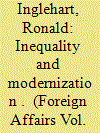|
|
|
Sort Order |
|
|
|
Items / Page
|
|
|
|
|
|
|
| Srl | Item |
| 1 |
ID:
158865


|
|
|
|
|
| Summary/Abstract |
Over the past decade, many marginally democratic countries have become increasingly author [2]itarian [2]. And authoritarian, xenophobic populist movements [3] have grown strong enough to threaten democracy’s long-term health in several rich, established democracies, including France, Germany, the Netherlands, Sweden, the United Kingdom, and the United States. How worried should we be about the outlook for democracy?
|
|
|
|
|
|
|
|
|
|
|
|
|
|
|
|
| 2 |
ID:
086023


|
|
|
|
|
| Publication |
2009.
|
| Summary/Abstract |
In the last several years, a democratic boom has given way to a democratic recession. Between 1985 and 1995, scores of countries made the transition to democracy, bringing widespread euphoria about democracy's future. But more recently, democracy has retreated in Bangladesh, Nigeria, the Philippines, Russia, Thailand, and Venezuela, and the Bush administration's attempts to establish democracy in Afghanistan and Iraq seem to have left both countries in chaos. These developments, along with the growing power of China and Russia, have led many observers to argue that democracy has reached its high-water mark and is no longer on the riseThat conclusion is mistaken. The underlying conditions of societies around the world point to a more complicated reality. The bad news is that it is unrealistic to assume that democratic institutions can be set up easily, almost anywhere, at any time. Although the outlook is never hopeless, democracy is most likely to emerge and survive when certain social and cultural conditions are in place. The Bush administration ignored this reality when it attempted to implant democracy in Iraq without first establishing internal security and overlooked cultural conditions that endangered the effort.The good news, however, is that the conditions conducive to democracy can and do emerge -- and the process of "modernization," according to abundant empirical evidence, advances them. Modernization is a syndrome of social changes linked to industrialization. Once set in motion, it tends to penetrate all aspects of life, bringing occupational specialization, urbanization, rising educational levels, rising life expectancy, and rapid economic growth. These create a self-reinforcing process that transforms social life and political institutions, bringing rising mass participation in politics and -- in the long run -- making the establishment of democratic political institutions increasingly likely. Today, we have a clearer idea than ever before of why and how this process of democratization happens
|
|
|
|
|
|
|
|
|
|
|
|
|
|
|
|
| 3 |
ID:
142689


|
|
|
|
|
| Summary/Abstract |
During the past century, economic inequality in the developed world has traced a massive U-shaped curve—starting high, curving downward, then curving sharply back up again. In 1915, the richest one percent of Americans earned roughly 18 percent of all national income. Their share plummeted in the 1930s and remained below ten percent through the 1970s, but by 2007, it had risen to 24 percent. Looking at household wealth rather than income, the rise of inequality has been even greater, with the share owned by the top 0.1 percent increasing to 22 percent from nine percent three decades ago. In 2011, the top one percent of U.S. households controlled 40 percent of the nation’s entire wealth. And while the U.S. case may be extreme, it is far from unique: all but a few of the countries of the Organization for Economic Cooperation and Development for which data are available experienced rising income inequality (before taxes and transfers) during the period from 1980 to 2009.
|
|
|
|
|
|
|
|
|
|
|
|
|
|
|
|
| 4 |
ID:
085113


|
|
|
|
|
| Publication |
2008.
|
| Summary/Abstract |
Mansoor Moaddel, Mark Tessler, and Ronald Inglehart use findings from two national values surveys that were carried out in Iraq in 2004 and 2006 to determine the attitudes of the Sunni Arabs toward Saddam Hussein, which they use as a proxy measure of their attitudes toward the Sunni insurgency and American-led coalition forces.
|
|
|
|
|
|
|
|
|
|
|
|
|
|
|
|
|
|
|
|
|